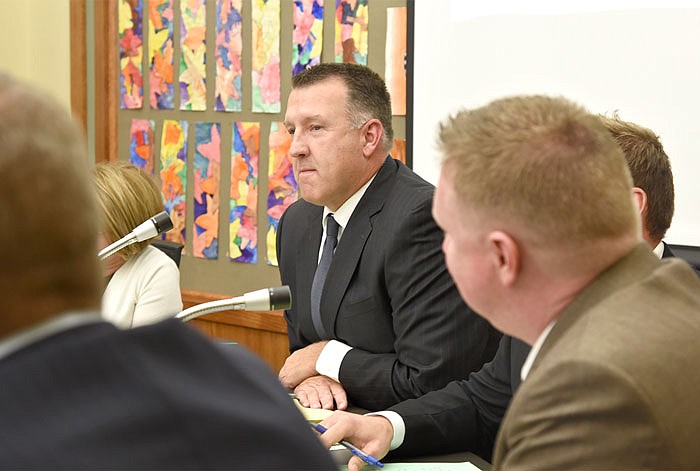Open forum speakers at Jefferson City Public Schools' Board of Education meetings will have an extra minute to speak, but what they can speak about still won't be quite as free range as what at least one board member would like.
"I'm pleased the way the board has listened to people," board member and policy review committee chair Pam Murray said after Thursday's committee meeting. Murray added she thinks the board is more receptive now to input from the community than it's ever been, something similar to what board President Steve Bruce said earlier in the meeting.
"I have all along wanted to drop that requirement," Murray said of speakers at board meeting open forums having to limit their comments to a posted agenda item.
She's brought up the suggestion to the committee before - this was the third time - proposing anyone be able to speak about anything, but "each year it's met with the same results."
The policy committee decided to keep the limitation in place when asked to vote on public comment rules at Thursday's meeting.
The committee did, however, vote to increase the allotted time for an open forum speaker from the current three minutes to four. They also decided to strike an unused rule that the board establish an overall time limit for the entire public comment period at meetings.
The policy committee's debate Thursday about the utility of limiting the public's ability to speak to only posted agenda items centered around whether the benefits would outweigh the potential problems.
"I'm just afraid of what it would do to our climate and culture as a district if it was just open for anything," Superintendent Larry Linthacum said. Linthacum wasn't comfortable with the idea of letting people air any and all grievances publicly - particularly if grievances pertain to specific staff members, especially once board meetings are live-streamed - if the speakers hadn't already tried to communicate their concerns with district or school building leadership.
He brought up the hypothetical example of a parent publicly airing a grievance with a teacher over a grade their child received.
In response to open forum guideline language Murray drafted to potentially address such a problem, Bruce said the board can post in writing and tell people at the start of a meeting what is and isn't appropriate to discuss publicly without having consulted administration first, but there's nothing stopping anyone from ignoring those guidelines.
That would then put the board in a tough position of "having to choose between a comment that might be deleterious to a teacher, family or a student" and having to tell the speaker to stop talking, which would be "bad form for this body to do that. To me, I think it's like a no-win. I just look at it as something, if that were to occur, it would have been better to avoid it altogether on the front end," he added.
"If someone comes to me with a problem, I'll work to address it as best I can, but hearing it at a board meeting for the first time, cold, doesn't help me as a board member any more than someone coming off the street," board Vice President Rich AuBuchon said. AuBuchon explained even if someone were to bring an issue to the board's attention in open forum, while the information might shape future agendas, there wouldn't be much opportunity for discussion in the moment.
"When you ask for people's opinion, it's always a mixed blessing when they speak," Murray said. Based on her tenure as an alderperson for Holts Summit, the benefits outweighed the problems, she said, because the city government was frequently able to hear about issues it had no idea people in the community were dealing with.
"To me, I think it works better when you funnel folks through that process," Bruce said of the district's available mechanisms for hearing about issues and dealing with them. "If through that process we have a patron or a resident and their concerns are not taken care of, they don't feel like they've been addressed, they don't feel like they've gotten the attention they deserve, then they can certainly approach Larry or me - or whoever's board president at the time - and ask for an agenda item, and say 'I wish to speak to the board about this.'"
Murray said after the meeting that if re-elected, she doesn't know if she'd bring up the issue again.

